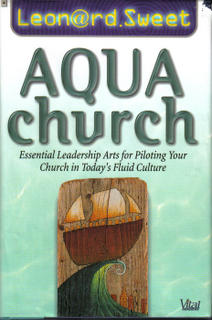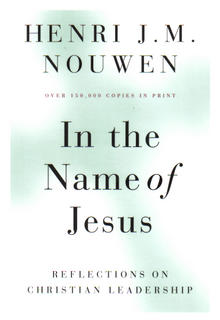Aqua Church
 Aqua Church by Leonard Sweet is an essential resource book for me as a young Christian leader. Sweet grabbed my attention with his postmodern parable on maps. The insights I took from the map illustration set a high expectation for the rest of the book. The continuous us of water as an analogy for our changing culture was powerful glue for his many streams of thought. The Captain’s Logbook including both a personal log and a ship’s log was incredible helpful for the application of each chapter.
Aqua Church by Leonard Sweet is an essential resource book for me as a young Christian leader. Sweet grabbed my attention with his postmodern parable on maps. The insights I took from the map illustration set a high expectation for the rest of the book. The continuous us of water as an analogy for our changing culture was powerful glue for his many streams of thought. The Captain’s Logbook including both a personal log and a ship’s log was incredible helpful for the application of each chapter.Jesus as the North Star was a great reminder to keep my focus clear and simply. I find it easy to get wrapped up in doing church, as apposed to following Jesus. The chapter was a great reminder of how worthy Jesus is of our adoration and devotion. I don’t think I emphasis enough how great it is to be a disciple of Jesus. Sweet provides a great list of Jesus’ attributes under his explanation of Jesus as the world greatest lover.
There are several great quotes in Sweet’s chapter on the Bible, but this one by Clark Pinnock was especially good, “There is something terribly wrong when we argue about the Bible more and enjoy it less.” It is important for me to see the Bible as God’s love letter, his compass, and the truth that sets me free. I want to be constantly moved by the power and truth of the scripture.
The anchor of Tradition shared in chapter 3 will be an analogy I will use over and over again. Sweet explains that tradition like a ships anchor in a storm is not meant to hold the ship in one place, but to move it forward. The crew cast the anchor forward in rough water, and slowly move through dangerous water. When we faces rough and dangerous decisions the best course of action is to anchor to the creeds and beliefs of the church throughout history. This kind of tradition does not hold us back, but helps us survive changing times.
Sweet’s chapter on Risk taking was great fuel for me as a church planter. I was charged up by each challenge to look for new solutions to old problems. The five types of responders to change listed in the Ship’s Log was extremely helpful. The five were: experimenters, early adaptors, frontrunners, late adapters, and slow movers. It is important for me to remember that no matter how good of effective the change is some personalities will not easily transition.
Leadership Art #6 is Vision. I found myself very interested in Blaise Pascal’s quote, “It is dangerous to show man too clearly how much he resembles the beast, without at the same time showing him his greatness. It is also dangerous to allow him too clear a vision of his greatness without his baseness. It is even more dangerous to leave him in ignorance of both.” This seems to be the tight rope between a worm theology of human depravity, and the prosperity gospel of God’s blessings. It seems to me to be difficult to not emphasis one over the other at any given time. Paradox is had enough to live in let alone preach.
The art of Creativity is not one of my greatest strengths, but it rates high on my desires. More than being creative I desire to see the creativity in others grow and mature. I want to invite creativity into the church and give it a place to live. I believe God as creator desires his people to be about the work of co creation with him. I am doing my best to honor and encourage the artist in our community, and bring out the creativity in every person.
I feel I have barely scratch the surface of all this book as birthed in me. Each chaptered caused my heart to race with excitement and passion for Jesus and his church. Again, the Ship’s Log is a place I continue to go back to for personal guidance and group activities. I want to thank Leonard Sweet for writing a great resource book for Christian leaders.

